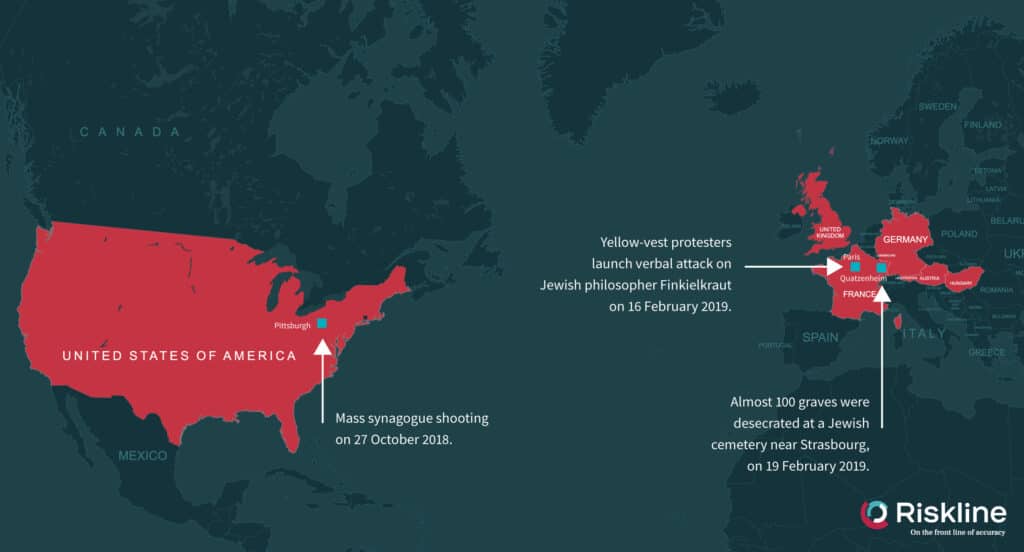A series of antisemitic incidents in France – a country that has the largest Jewish population in Europe – has provoked public outrage and left the Jewish community questioning whether they have a future in the country. Following acts ranging from desecration of Jewish graves to verbal abuse against Jewish intellectual Alain Finkielkraut in February, over 20,000 people gathered in Paris as part of nationwide protests held to condemn antisemitism.
Figures show that such antisemitic acts are not isolated incidents, nor are they unique to France. Months prior to the string of antisemitic incidents in France, 11 people were killed in a mass shooting at a synagogue by a shooter who “wanted all Jews to die” in October 2018 in the American city of Pittsburgh, Pennsylvania. The French interior ministry indicated that the number of reported antisemitic acts in France increased by 74 percent from 311 in 2017 to 541 in 2018, and the United Kingdom, Austria, Germany and the United States also saw increases during the same period, showing that such acts of violence are part of a pattern of increasing hate speech and violence against the Jewish community across the Western world.
Extremist rhetoric and indifference to extremism contribute to a hostile environment for the Jewish community. In August 2017, far-right demonstrators chanted “Jews will not replace us” in the American city of Charlottesville, Virginia, on the night before a white nationalist targeted counter-protesters in a deadly car-ramming attack. President Donald Trump responded by saying that there was blame and “very fine people” on “both sides”.
While most far-right parties officially reject antisemitism, their members have repeatedly made remarks that have been criticised by the Jewish community. In 2017, Björn Höcke of the far-right Alternative for Germany (AfD) called the Holocaust memorial in Berlin a “memorial of shame” and called for changing Germany’s “commemoration policy” of the Holocaust. In Hungary, right-wing Prime Minister Viktor Orbán attacked George Soros, a Jewish billionaire with Hungarian origins, with antisemitic overtones accusing Soros of “[speculating] with money” and calling him “not national but international”. In 2017,campaign billboards displaying an image of Soros with caption “Don’t let Soros have the last laugh” appeared across the country, evoking historical antisemitic stereotypes associated with wealth and Zionist conspiracy theories.
Recent incidents and figures show that antisemitism is a growing threat and a form of hate expressed in ways more complex than outright violence and harassment. While statements of condemnation and mass demonstrations are positive first steps, authorities can take more permanent and concrete measures to show that they take antisemitism seriously. In one such measure, Germany created a commission against antisemitism and a reporting centre to receive accounts of antisemitic incidents, regardless of whether these cases are prosecutable crimes. As already done by France, another possibility is adopting a more nuanced, comprehensive definition of antisemitism as drafted by the International Holocaust Remembrance Alliance (IHRA) to recognise antisemitism in various forms: trivialising the Holocaust, questioning the allegiance of the Jewish community to their country and evoking historical antisemitic imagery and conspiracy theories. While acts of violence, vandalism and verbal abuse that have already shocked the public are irreversible, government actions can help decide whether such incidents are a catalyst to fight hate or a sign of more to come.















